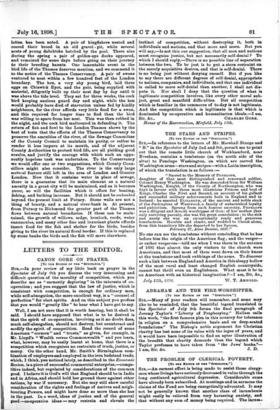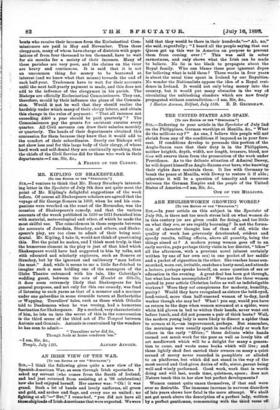THE PROBLEM OF CLERICAL POVERTY. [To THE EDITOR Or THE
" SPECTATOR...I SIR,—An earnest effort is being made to assist those clergy- men whose livings have seriously decreased in value through the long continued agricultural depression. Considerable sums have already been subscribed. At meetings and in sermons the claims of the Fund are being energetically advocated. It may not be generally known that another class of incumbents might easily be relieved from very harassing anxiety, and that without any sum of money being required. The incum-
bents who receive their incomes from the Ecclesiastical Com- missioners are paid in May and November. Thus these clergymen, many of whom have charge of districts with popu- lations of from four thousand to ten thousand, have to wait for six months for a moiety of their incomes. Many of these parishes are very poor, and the claims on the vicar are heavy and continuous. It is said that it is not an uncommon thing for money to be borrowed at interest (and we know what that means) towards the end of each half-year. Tradesmen have to wait for their accounts until the next half-yearly payment is made, and this does not add to the influence of the clergyman in his parish. The Bishops are officially Ecclesiastical Commissioners. They can, therefore, mould by their influence the plans of the Commis- sion. Would it not be well that they should realise the hardship under which many of their clergy labour, and obtain this change in the rules of payment : " That all incomes not exceeding £400 a year should be paid quarterly " ? The Commissioners pay the grants for assistant curates every quarter. All Civil servants can draw their salaries monthly or quarterly. The heads of their departments obtained this concession for them because they knew that it would add to the comfort of their subordinates. Surely our Bishops will not show less zeal for this large body of their clergy, of whose hard work and self-denial they are continually speaking, than the chiefs of the Civil Service did for those who work in their departments.—I am, Sir, &c.,
A FRIEND OF THE CLERGY.



































 Previous page
Previous page